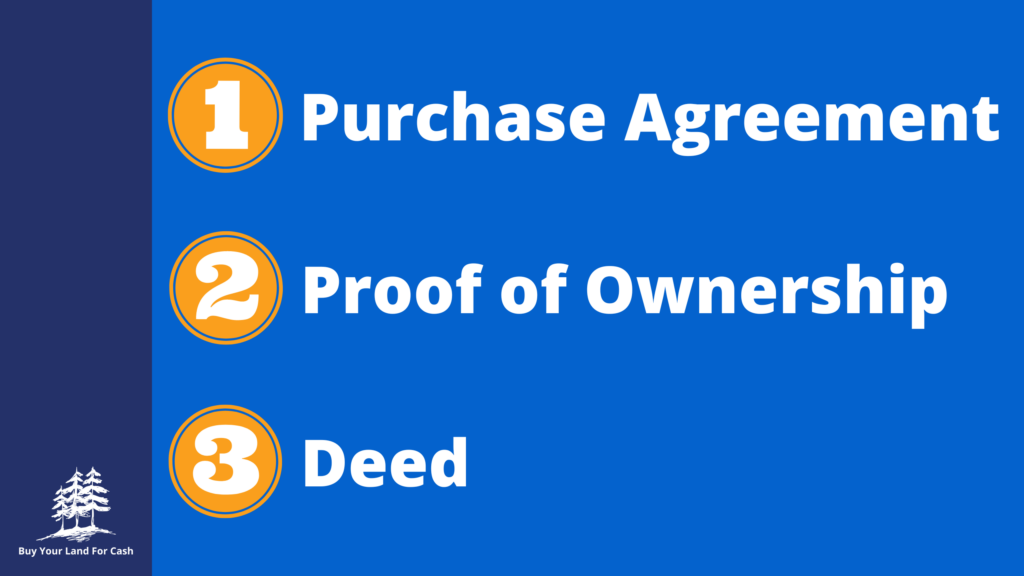From the video:
When selling vacant land, several documents may be required to complete the transaction.

Note: When selling land as a for-sale-by-owner (FSBO), you will typically need to provide the same documentation as if you were working with a real estate agent.
These documents can vary depending on the location and specific circumstances of the land, but some common documents include:
- A current survey of the property: This will show the boundaries, dimensions, and any improvements on the land.
- A property title or deed: This document proves ownership of the land and will be necessary to transfer ownership to the buyer.
- Zoning and land use documents: These will show if the land is zoned for the intended use and that it complies with local regulations.
- Environmental reports: These will show if the land has any known environmental hazards or issues that might impact the value or use of the land.
- Building permits and inspections: If any structures or improvements have been made on the land, you may need to provide proof that they were built legally and comply with local building codes.
- Tax statements: You may need to provide proof of payment of current and past taxes on the property.
- Disclosure statement: A document that lists any known issues or defects of the property that may affect its value.
- Death certificate: A legal document issued by a government agency, typically a vital statistics office or a health department, that certifies the fact of a person’s death. May be required in situations where a property is inherited following the death of the previous owner.
- Affidavit: A written statement that is sworn or affirmed to be true. A document that is used to make a statement or affirmation to prove a fact or a situation. Can prove various facts about the property. Some states may require an affidavit to be provided by the seller as part of the sales process, while others may not require one.
It’s important to consult with a local real estate attorney to ensure that you have all the necessary documents and that the sale is in compliance with local and state laws. Additionally, it’s important to be aware that if you’re selling FSBO, you will be responsible for advertising, showing the property, and negotiating the sale, so it’s important to be familiar with the local real estate market and the process of selling property.
That’s a big laundry list of paperwork – and truthfully, you don’t need all those documents to sell land. It really comes down to a few crucial ones.
Documents You Really Need to Sell Land

Purchase Agreement
A purchase agreement, also known as a sales contract or purchase contract, is a legally binding document that outlines the terms and conditions of a real estate transaction between a buyer and a seller. It is a written agreement that specifies the price, closing date, and other important details of the sale.
A purchase agreement typically includes the following information:
- The legal description of the property
- The names of the buyer and seller
- The purchase price and terms of payment
- The closing date and location
- Any contingencies that must be met before the sale can be completed (e.g. inspections, financing, zoning)
- Any warranties or representations made by the seller
- Any disclosures or notices required by law
- The date of the agreement
It’s important to note that purchase agreements are legally binding and should be reviewed by an attorney before signing. Once both parties sign the purchase agreement, it becomes a legally binding contract and the terms outlined in the agreement must be fulfilled by both parties.
It’s also important to note that purchase agreements may be different in each state, so it’s important to understand the specific requirements and regulations of the state where the property is located.
Proof of Ownership
Proof of ownership comes in the form of a land title, also known as a property title or property deed. It’s a legal document that proves ownership of a piece of real estate. It includes a description of the property, the names of the current and past owners, and any liens or encumbrances on the property.

The land title is the official record of ownership for a piece of property and it is recorded with the local government. It’s considered as the evidence of ownership of the property. The title is typically held by the owner in “fee simple” which means the owner has the right to use, possess, and dispose of the property.
The title also contains information about any restrictions or easements on the property, such as a right-of-way for a neighboring property or a zoning restriction that limits how the property can be used.
Having a clear title means that there are no outstanding legal claims or liens against the property, and that the seller has the legal right to sell the property.
To check the title of a property, a title search can be done. It’s a process to check the public records and ensure that the title is clear, and that the seller is the legal owner of the property. It’s highly recommended to have a title search done by a title company or attorney before purchasing a property.
Deed
A deed in real estate is a legal document that is used to transfer ownership of a piece of property from one person (the grantor) to another person (the grantee). The deed includes a description of the property, the names of the current and past owners, and any liens or encumbrances on the property. It’s a written instrument that, when executed and delivered, conveys title to real property.
The most common types of deeds are:
- Warranty Deed: It provides a guarantee of clear title to the buyer. It implies that the seller has good title to the property and has the right to convey it to the buyer.
- Quit Claim Deed: It conveys whatever interest the grantor has in the property to the grantee but it doesn’t guarantee that the grantor has good title to the property. It’s often used when the grantor wants to transfer property but is uncertain of the exact nature of his or her interest in it.
- Special Warranty Deed: It’s similar to a warranty deed but the grantor only guarantees title against defects arising during the grantor’s ownership of the property.

The deed must be signed, notarized and delivered to the buyer. It must also be recorded in the public records of the county where the property is located. This process is called recording the deed. Recording the deed ensures that the new ownership is a matter of public record and it also gives notice to any other parties that may have an interest in the property.
It’s important to note that a deed alone doesn’t prove ownership, it’s the title that provides evidence of ownership. A deed is a way of transferring ownership, while a title is the evidence of ownership.
In conclusion, when selling vacant land, several documents may be required to complete the transaction. These documents can vary depending on the location and specific circumstances of the land.
The most essential documents to sell land are the Purchase Agreement, Proof of Ownership, and a Deed, which are legally binding and necessary to transfer the ownership of the property. It’s important to ensure that the purchase agreement is reviewed by an attorney before signing, and that the property title is clear and the seller has the legal right to sell the property.



